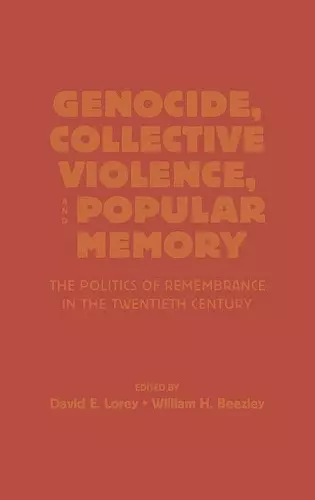Genocide, Collective Violence, and Popular Memory
The Politics of Remembrance in the Twentieth Century
William H Beezley author David E Lorey author
Format:Hardback
Publisher:Rowman & Littlefield
Published:1st Nov '01
Currently unavailable, and unfortunately no date known when it will be back
This hardback is available in another edition too:
- Paperback£40.00(9780842029827)

The twentieth century has been scarred by political violence and genocide, reaching its extreme in the Holocaust. Yet, at the same time, the century has been marked by a growing commitment to human rights. This volume highlights the importance of history-of socially processed memory-in resolving the wounds left by massive state-sponsored political violence and in preventing future episodes of violence. In Genocide, Collective Violence, and Popular Memory: The Politics of Remembrance in the Twentieth Century, the editors present and discuss the many different social responses to the challenge of coming to terms with past reigns of terror and collective violence. Designed for undergraduate courses in political violence and revolution, this volume treats a wide variety of incidents of collective violence-from decades-long genocide to short-lived massacres. The selection of essays provides a broad range of thought-provoking case studies from Latin America, Africa, Europe, and Asia. This provocative collection of readings from around the world will spur debate and discussion of this timely and important topic in the classroom and beyond.
How did nations and communities respond to the aftermath of genocide and collective violence in the twentieth century? How have nations sought to achieve 'reconciliation' with a legacy of state-sponsored terrorism, systematic torture and repression, massacres, mass graves, forced disappearances, and 'ethnic cleansing'? This broad-ranging collection of articles seeks to answer these questions by drawing on case studies from Africa, Asia, Latin America, and Europe. A powerful introduction to the politics of history and the cultural history of social memory, this is an ideal reader for undergraduate and graduate courses on human rights, international law, social psychology, and world history, especially the complex history of historical construction and reconstruction of a violent 'past' as part of the present. -- Brian Loveman, San Diego State University
A rich and useful comparative collection of articles that tells the story of history as politics. It describes the struggle to remember and the violent attempts to repress national memory. The essays address controversial issues that will inform students and are bound to encourage animated discussion in the classroom. -- Elazar Barkan, Claremont Graduate University
At a time when the World Court is investigating and punishing crimes of genocide, this book is an invaluable resource that will instruct and fascinate for years to come. The accounts from around the world are reminders of how the search for justice and for national identity are often at odds and shaped by the demands of politics and international diplomacy. Anyone interested in human rights and how nations deal with the horrors of the past will find this work an important contribution. -- Marguerite Guzman Bouvard, Brandeis University; Author of The Path Through Grief: A Compassionate Guide
ISBN: 9780842029810
Dimensions: 236mm x 162mm x 24mm
Weight: 594g
258 pages